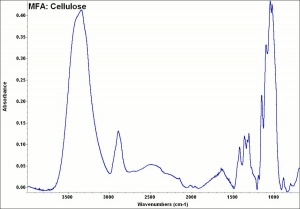Difference between revisions of "Cellulose"
(username removed) |
|||
| Line 1: | Line 1: | ||
== Description == | == Description == | ||
| − | A complex natural [ | + | A complex natural [[carbohydrate]], or [[polysaccharide]], composed of long, connected chains of [[glucose]] molecules. Cellulose can have a molecular weight from 160,000 to 560,000. It is the primary component in the cell walls of plants where the cellulose molecules are often linked together in parallel units called microfibrils. Pure cellulose is an odorless, tasteless white powder. Cellulose exists in three forms: [[Alpha cellulose|alpha]], [[beta cellulose|beta]] and [[gamma cellulose|gamma]]. Alpha cellulose has the highest degree of polymerization (DP) and is the chief constituent of paper pulp. [[Cotton]] is composed of about 90% alpha cellulose. The beta and gamma cellulose have a much lower DP and are collectively known as [[hemicellulose]]. Cellulose is used to manufacture paper and textiles. It is also a raw material in the manufacture of [[viscose rayon|rayon]], [[cellophane]], [[cellulose acetate]], and [[celluloid]]. |
== Synonyms and Related Terms == | == Synonyms and Related Terms == | ||
Revision as of 18:43, 12 January 2014
Description
A complex natural Carbohydrate, or Polysaccharide, composed of long, connected chains of Glucose molecules. Cellulose can have a molecular weight from 160,000 to 560,000. It is the primary component in the cell walls of plants where the cellulose molecules are often linked together in parallel units called microfibrils. Pure cellulose is an odorless, tasteless white powder. Cellulose exists in three forms: alpha, beta and gamma. Alpha cellulose has the highest degree of polymerization (DP) and is the chief constituent of paper pulp. Cotton is composed of about 90% alpha cellulose. The beta and gamma cellulose have a much lower DP and are collectively known as Hemicellulose. Cellulose is used to manufacture paper and textiles. It is also a raw material in the manufacture of rayon, Cellophane, Cellulose acetate, and Celluloid.
Synonyms and Related Terms
flour cellulose; cellulose (Fr.); celulosa (Esp.); Zellstoff (Deut.); cellulosa (It.); celulose (Port.)
Other Properties
Soluble in sulfuric acid. Insoluble in water and other common solvents.
| Composition | (C6H10O5)n |
|---|---|
| CAS | 9004-34-6 |
| Density | 0.3 |
| Refractive Index | 1.55 |
Hazards and Safety
Combustible.
Many bacteria and fungi can hydrolyze cellulose.
Mallinckrodt Baker: MSDS
Authority
- The Merck Index, Martha Windholz (ed.), Merck Research Labs, Rahway NJ, 10th edition, 1983 Comment: Entry 2012
- Encyclopedia Britannica, http://www.britannica.com Comment: "cellulose" [Accessed April 9, 2002].
- G.S.Brady, Materials Handbook, McGraw-Hill Book Co., New York, 1971 Comment: p. 166
- Richard S. Lewis, Hawley's Condensed Chemical Dictionary, Van Nostrand Reinhold, New York, 10th ed., 1993
- Hoechst Celanese Corporation, Dictionary of Fiber & Textile Technology (older version called Man-made Fiber and Textile Dictionary, 1965), Hoechst Celanese Corporation, Charlotte NC, 1990
- Boise Cascade Paper Group, The Paper Handbook, Boise Cascade, Portland OR, 1989
- Matt Roberts, Don Etherington, Bookbinding and the Conservation of Books: a Dictionary of Descriptive Terminology, U.S. Government Printing Office, Washington DC, 1982
- Van Nostrand's Scientific Encyclopedia, Douglas M. Considine (ed.), Van Nostrand Reinhold, New York, 1976
- Random House, Webster's Encyclopedic Unabridged Dictionary of the English Language, Grammercy Book, New York, 1997
- The American Heritage Dictionary or Encarta, via Microsoft Bookshelf 98, Microsoft Corp., 1998
- Wikipedia, the free encyclopedia, at http://www.wikipedia.com Comment: http://en.wikipedia.org/wiki/Cellulose (Accessed Jan. 15, 2006)
- G.Caneva, M.P.Nugari, O.Salvadori, Biology in the Conservation of Works of Art, ICCROM, Rome, 1991
- Art and Architecture Thesaurus Online, http://www.getty.edu/research/tools/vocabulary/aat/, J. Paul Getty Trust, Los Angeles, 2000
